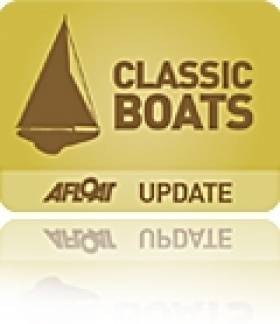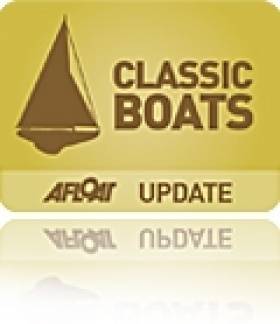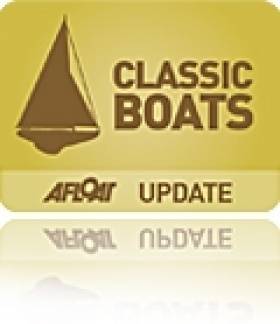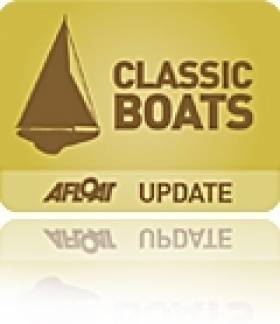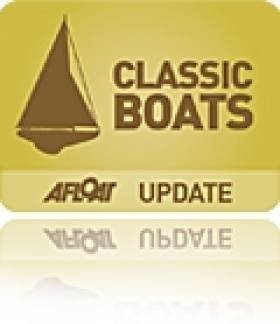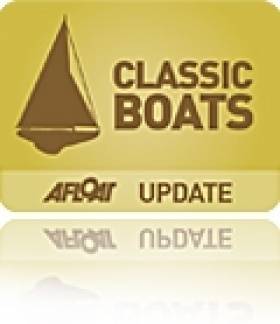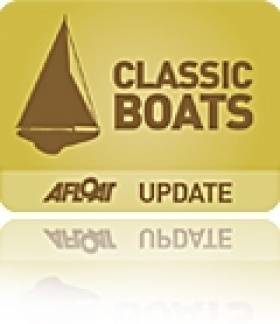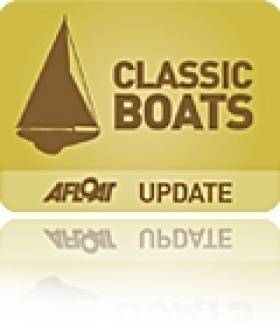Displaying items by tag: Historic Boats
AGM Aims To Reverse 'Terminal Decline' Of Mermaid Class
#Mermaid - Reversing the "terminal decline" of the once preeminent Mermaid class is the aim of the 64th Mermaid Sailing Association AGM at Skerries Sailing Club this month.
MSA secretary Des Deane has circulated details of the meeting at 8pm on Friday 27 November, calling on Mermaid owners and crews who have lost contact with the class to attended and help determine a "fresh approach" to how it's run and what sort of racing members want, among others.
A source close to Afloat.ie says the decline of the Mermaid "can be traced back to the fateful decision to abandon the composite glass fibre boat 'Dolly'" – designed in the mid 2000s in an effort to revitalise the class.
Our source added that "no Mermaids have been sailed regularly ... in any numbers since the '90s" from Clontarf Boat and Yacht Club, which has hosted previous MSA AGMs for the last 50 years.
And it's feared that the trend of leading sailors parking their Mermaids in garages across the country, or even selling their boats, will lead to an irreversible decline at a time when classic classes like the Water Wags and Dublin Bay 12-footers are enjoying a revival.
Afloat.ie will have more news from the Mermaid class AGM later this month.
World War I Shipwrecks Revealed In Irish Sea
#HistoricBoats - A team of scientists aboard the Marine Institute's research vessel Celtic Voyager has revealed detailed images of World War I shipwrecks in the Irish Sea.
The team, led by Dr Ruth Plets of the School of Environmental Sciences at Ulster University, set out to capture the highest resolution acoustic data possible of WWI shipwrecks lost in the Irish Sea, using a new multi-beam system (EM2040) on board the RV Celtic Voyager to get the best data ever acquired over these wrecks.
"We were able to capture the most detailed images of the entirety of the wrecks ever," said Dr Plets. "Some of the wrecks, which are too deep to be dived on, have not been seen in 100 years. So this is the first time we can examine what has happened to them, during sinking and in the intervening 100 years, and try to predict their future preservation state."
Among the shipwrecks surveyed were the SS Chirripo, which sank in 1917 off Black Head in Co Antrim after she struck a mine; the SS Polwell, which was torpedoed in 1918 northeast of Lambay Island; and the RMS Leinster, which sank in 1918 after being torpedoed off Howth Head, killing over over 500 people - the single greatest loss of live in the Irish Sea.
Marine Institute chief executive Dr Peter Heffernan welcomed the achievements of the survey, supported by the competitive ship-time programme, saying: "The multidisciplinary team is making an important contribution to understanding and protecting our maritime heritage and to our ability to manage our marine resource wisely."
Explaining how the survey was carried out, Dr Plets added: "We moved away from traditional survey strategies by slowing the vessel right down to allow us to get many more data points over the wreck, with millions of sounding per wreck."
"The detail is amazing as we can see things such as handrails, masts, the hawse pipe – where the anchor was stored – and hatches. Some of the vessels have split into sections, and we can even see details of the internal structure. With the visibility conditions in the Irish Sea, no diver or underwater camera could ever get such a great overview of these wrecks."
As well as acoustic imaging, the team collected samples from around the wreck to see what its potential impact is on the seabed ecology. Sediment samples were also taken for chemical analysis to determine if these wrecks cause a concern for pollution.
The project is carried out to coincide with WWI centenary commemorations, noted Dr Plets. "We often forget the battles that were fought in our seas; more emphasis is put on the battles that went on in the trenches. However, at least 2,000 Irishmen lost their lives at sea, but unlike on land, there is no tangible monument or place to commemorate because of the location on the bottom of the sea.
"In the Republic of Ireland there is a blanket protection of all wrecks older than 100 years, so all these will become protected over the next few years. To manage and protect these sites for future generations, we need to know their current preservation state and understand the processes that are affecting the sites."
The next step for the team is to use the data collected to create 3D models which can be used for archaeological research, heritage management and dissemination of these otherwise inaccessible sites to the wider public.
"There is so much data, it will take us many months if not years, to work it all up," said Dr Plets. "Some of the wrecks are in a very dynamic environment and we are planning to survey these vessels again next year to see if there is a change, especially after the winter storms. That will give the heritage managers a better idea if any intervention measures need to be taken to protect them.
"These data could well signal a new era in the field of maritime archaeology. We hope it will inspire a new generation of marine scientists, archaeologists and historians to become involved. Above all, we want to make the general public, young and old, aware of the presence of such wrecks, often located only miles off their local beach."
The research survey was supported by the Marine Institute, through its Ship-Time Programme, funded under the Marine Research Sub-Programme by the Government.
The diverse team included maritime archaeologists Rory McNeary from the Northern Ireland Department of the Environment and Kieran Westley from the University of Southampton; geologists Rory Quinn and Ruth Plets, both Ulster University; biologists Annika Clements from Agri-Food and Biosciences Institute and Chris McGonigle from Ulster University; Ulster University marine science student Mekayla Dale; and hydrographer Fabio Sacchetti from the Marine Institute who works on Ireland's national seabed mapping programme INFOMAR, run jointly with the Geological Survey of Ireland.
The team blogged about the seven-day survey at Scientists@Sea.
Glandore Launches CH Marine Classic Boat Regatta
#glandoreclassicregatta – The 12th CH Marine Glandore Classic Regatta was launched on Wednesday at the Kiln Bar in Murphy Brewery in Cork. An enthusiastic crowd of classic boat followers attended the launch of the biennial event which takes place from 18th–24th July 2015.
There will be a Parade of Sail on the Sunday of the Regatta plus competitive racing during the week. The very popular "Music in the Street" gig also takes place on Sunday evening. Bill Sandberg (USA) returns as our Principal Race Officer in 2015. The Baltimore/Fastnet cruise and Castletownshend race will take place during the week of the Regatta. This year there will be a special welcome for gaff rigged boats with members of the Old Gaffers Association attending Glandore Classic Regatta as part of their cruise along the West Cork coast.
Jim Cashman of Heineken welcomed the Commodore and Classic committee members, sponsors and invited guests present.
Following this introduction Nick Bendon of CH Marine spoke of his company's involvement in the regatta in recent years and remarked how after a very quiet season in Glandore last year this year already the village is buzzing and business is definitely on the UP. With the re-opened Glandore Inn and the newly opened Glandore Bistro at the Pier House, as well as Hayes' and Casey's bar exceptionally busy over the recent Easter weekend and May Holiday. Nick looks forward to a very successful CH Marine Glandore Classic Regatta next July.
Sean Walsh, the Commodore of the Old Gaffers Association then addressed the gathering and told us about the Old Gaffers Association, a world wide group with members drawn from lovers of gaff rigged boats from all over the world, though mostly from UK, Ireland and France. Sean told us that this year the Old Gaffers were having their Big Cruise on the South Coast and were making a bee line for the Glandore Classic Regatta as part of their Cruise which will then being them as far west as the Fastnet and Skellig Michael. Sean also reminded us that since he first visited the Classic Regatta in 1992 he has returned each time to the warmest of welcomes at the Club and in Glandore Harbour generally. The Commodore John Dowling closed with a review of some of the boats that are planning to be in Glandore for the Regatta next July, a number are regular visitors, there are a a few which have been in re build right through last winter, and also a number that were re launched for the first time during last season. We look forward to welcome back the Cork One Designs and the Anglsea Fifes, as well as the Ettes of Castletownshend to name just a few.
The Glandore Classic Regatta runs from Saturday July 18th to Friday July 24th, The Regatta opening ceremony takes place on Saturday evening July 18th, The parade of sail occurs on Sunday afternoon July 19th. There is a sailing and racing programme of activities daily until Friday 24th when the regatta closes with the final prize giving. Throughout the week there is a full schedule of events including recitals, lectures, quiz, BBQ,street music etc.
#historicboats – There is a small group of islands in the Lesser Antilles where the traditions of boatbuilding were once crucial to the survival of local communities skimming a living from the sea. Hundreds of sailing vessels were once launched here, more than anywhere in the West Indies.
Today there is no more trading by sail, and these skills have vanished elsewhere in the region.
The film "Vanishing Sail" represents over fifteen years of research and documenting the art form of wooden boatbuilding in the Eastern Caribbean.
The Premiere of the movie "Vanishing Sail" - what a night! West Indies sloops & schooners from up and down the islands gathered on the dock for the 20th anniversary St. Barth Film Festival.
By nightfall the crowd swelled to 350 + people, a brief intro and the music of the sea began. The dock became wrapped in silence, only the creaking of mooring lines, the vessels all swaying together lit by the moon, all feeling the story as one.
Very powerful indeed to finally see our film come alive on a huge screen with such a wonderful audience followed by a standing ovation.
The film will be screened at selected Film Festivals during this summer & fall prior to a general release.
Naomh Éanna Refurbishment Partners Sought to Operate Former Aran Ferry
#NaomhÉanna - A campaign continues to transform a former Aran Islands ferry which plied the route from Galway, into a major tourist attraction, reports the Galway Advertiser.
However if a financial plan is not established within a number of weeks there is a risk that the Naomh Eanna will have to be consigned to the scrapyard and Galway will lose out on an attraction which could, in time, be worth millions to the local economy.
The Naomh Eanna was withdrawn from service in 1989 and has been lying derelict in Dublin Port for more than 25 years. Last year it emerged that there were controversial plans by Waterways Ireland for her to be scrapped.
She has now been acquired by the Irish Ship and Barge Fabrication Company as also previously reported on Afloat.ie back in September. The firm specialises in the restoration of high quality heritage maritime holdings.
There are ambitious plans in place for a major refit of the Naomh Eanna to include an 80 bedroom boutique hostel, a restaurant and cafe, an island museum and micro brewery.
It is proposed she will be moored at Long Walk and become a focal point for tourism in Galway.
The Irish Ship and Barge Fabrication Company has begun work to try to structure a financial package to deliver the finished product. It is estimated that the project, which has been approved as a tax efficient investment, will cost €2.4 million.
For more on this development surrounding the Dublin-built veteran vessel, click HERE.
Canadians Lobby To Keep 'Grandfather Canoe' Amid Ownership Fears
#HistoricBoats - A Canadian community descended from the builders of the world's oldest birchbark canoe have expressed concern that the vessel may be returned to Ireland, according to The Irish Times.
As previously reported on Afloat.ie, the 'Grandfather Canoe', or Akwiten, was crafted by the Mailseet First Nation in Canada's Maritimes for use on the St John River valley in New Brunswick under British colonial rule almost 200 years ago.
A programme for RTÉ Radio's Documentary on One strand in August explained how the canoe later passed into the ownership of British army captain Stepney St George, who took it home to Headford Castle, from where it was later bequeathed to NUI Galway.
In the 2000s the canoe was rediscovered and after a First Nations campaign, in 2009 it was repatriated and presented to the Beaverbrook art gallery in New Brunswick, where it is presently in storage without exhibition space.
It has lately emerged that the historic vessel's current ownership status is unclear, prompting fears that it may be sent back to the City of the Tribes.
Members of the Mailseet community are now lobbying for the right to care for and exhibit what is a "spiritual and cultural artefact" to their people.
The Irish Times has more on the story HERE.
Belfast-Based Battleship from WWI to be Restored Into Museum
#HMScaroline – The National Museum of the Royal Navy (NMRN) has been boosted by a £1m lottery funding to turn Belfast-based HMS Caroline into a visitor attraction in time for the 1916 Battle of Jutland centenary celebrations off the coast of Denmark.
The derelict vessel, which is currently docked in the same Belfast shipyards where the Titanic was built, was in danger of rusting away or even being scrapped before moves to restore it started to build up steam two years ago.
The Heritage Lottery Fund has now awarded £11.5 million to fund the work ahead of 2016. For further coverage of this development, The Belfast Telegraph has a report HERE.
Canadian Shipwreck Discovery Solves 170-Year-Old Mystery
#Shipwreck - "One of Canada's greatest mysteries has been solved," said that country's Prime Minister Stephen Harper earlier this month upon news that the wreck of one of two ships famously lost in a mid-19th-century Arctic expedition has likely been located.
National Geographic has details of the rediscovery of the remains of either the HMS Erebus and HMS Terror, both of which disappeared in 1846 during an ill-fated expedition led by Sir John Franklin to map the Northwest Passage.
Sonar images captured by an ROV off King William Island in the northern Canadian province of Nunavut show the mostly intact hull of a ship – and according to maritime historian James Delgado, "there is no doubt" that it represents that final resting place of one of the lost vessels.
What's more, the ship's largely preserved condition means it could prove an invaluable "time capsule" to learn more about the people who embarked on that voyage some 170 years ago.
National Geographic has much more on the story HERE.
Historic Boats Shape Up for Solent's Classic Week
#classicboats – Cowes produced near perfect conditions for day three of Panerai British Classic boat Week where Squadron Racing Ltd ran two more excellent races in the Central Solent for the 52-strong fleet. With hot sun, a balmy sea breeze that built from sub 10 to almost 20 knots and more gleaming varnish and brass than you can shake a stick at, it was a spectacular day's sailing and great fun was had by all. With four of the seven race series now completed, the overall standings are shaping up and we can expect the next three days to be full of excitement.
In Class 3 Christine and Giovanni Belgrano's Whooper continues to dominate, winning both of today's races to make it four straight wins overall. Andy King's Gluckauf took second in both races and Rob Gray and Sam Laidlaw's Clarionet was third in both. In the overall standings Whooper unsurprisingly leads Class 3 with just four points. Although Gluckauf was the better performer today she is counting a Did Not Compete from yesterday's Around The Island Race and so Clarionet is lying in second overall on eleven points with Gluckauf two points behind them in third.
Mikado, owned by Michael Briggs, also claimed two first places today in Class 4 and so jumps into the lead overall with a seven point margin. After a lacklustre start to the regatta, Bob Gatehouse's Erida found her form this morning to finish second in race three, just ahead of David Foster and Ben Gillett's Leopard who also favoured this morning's lighter conditions. This afternoon Jonathan and Scilla Dyke's Cereste took second from David Messum's Nausicaa. In the overall standings Mikado is leading with seven points, Nausicaa is second on fourteen points and Cereste is third on twenty-two points.
Sean McMillan's Spirit 52 Flight of Ufford was once again the most consistent performer in Class 1, adding a first and second to their score card. Stephen O"Flaherty's Soufriere won race four and having claimed third in race three she now lies in second place overall, just three points behind Flight of Ufford. Michael Hough's Chloe had another good day with a second and third so lies just two points back in third overall.
In Class 2 race three proved to be somewhat controversial. There was a start line port starboard incident between David Murrin's Cetewayo and Ebsen Poulsson and Ed Dubois' Firebrand that later resulted in the Protest Committee awarding a 4% penalty against Firebrand. Then Cetewayo misjudged their approach to Gurnard Ledge and made contact with the buoy requiring them to take a 2% penalty. Jamie Matheson's Opposition was the clear winner of the race and after all the penalties were applied Firebrand was scored second and Cetewayo third. Race four was decided entirely on the water with victory going to Cetewayo with Opposition second and Firebrand third. In the overall standings Class 2 is now led by Firebrand on eight points, Cetewayo is second on nineteen points and Opposition is just one point further back in third.
In the 8 Metres the opening race of the day went to Christopher Courage's Helen who was also looking very good in race four until they became aware that the boat, which they only took possession of last week, was taking water fast. Unable to immediately trace the source of the water they pulled up on the final beat allowing their fellow competitors to sail on by. Back ashore they discovered the offending problem was a faulty bilge pump which was back filling. Christopher, who currently counts two wins and two retirements, joked that, "If we could just finish the races we'd be winning the regatta!" Whilst Helen had her dramas Murdoch McKillop's Saskia was proving to be the most consistent boat of the day with a pair of second places, while Athena finished third in race three and went on to win race four. In the overall standings Saskia now leads the 8 Metres by a single point from Athena with Helen two points behind in third.
This evening the participants are making the most of the wonderful weather with an Open Boats Dock Party sponsored by Classic Boat and Wight Vodka. This event is a perennial favourite as not only does it give you a chance to take a look at your competitors boats, but its also the perfect opportunity to compare battle stories and swop tips on the restoration and maintenance of these wonderful yachts.
Tomorrow will feature race five in the main points series followed by the Ladies Race, where the boats must helmed by lady. The first start will be at 10.00 from the Royal Yacht Squadron line with the second race following on. After sailing the Royal Corinthian Yacht Club will host the traditional crews party.
Racing continues until Friday 18 July and the event will conclude with a Parade of Sail past the Royal Yacht Squadron and Cowes Green at 11.00 on Saturday 19 July.
#NaomhEanna -The Naomh Éanna, a former CIE ferry that campaigners are attempting to save from being scrapped appears to be making progress, reports TheJournal.ie
Having reached a deal to take over responsibility for the vessel with a number of other stakeholders or potential stakeholders involved in deciding her fate.
Only the question of whether NAMA will allow the group to carry out survey and repairs as previously reported on Afloat.ie on the heritage vessel remains a potential stumbling block.
However, a meeting with the agency is being arranged for the coming days, at which the issue will be discussed.
Built in the Liffey Dock in 1956 and once used to carry passengers and supplies between Galway and the Aran Islands, the ferry has been berthed in Dublin's Grand Canal Dock since the late 1980s — where she has since fallen into disrepair.
Waterways Ireland, which manages the docks, had been planning to scrap the vessel; safety concerns were raised in a hull inspection, and the ship could not be moved from the waterway under her own power.
Campaigners had asked for the plan to scrap the vessel to be delayed — but such a move seemed unlikely, until Minister Jimmy Deenihan announced a last-minute stay of execution earlier this year, following questioning in the Seanad from Senator David Norris.
For more on this latest development, visit HERE.



























